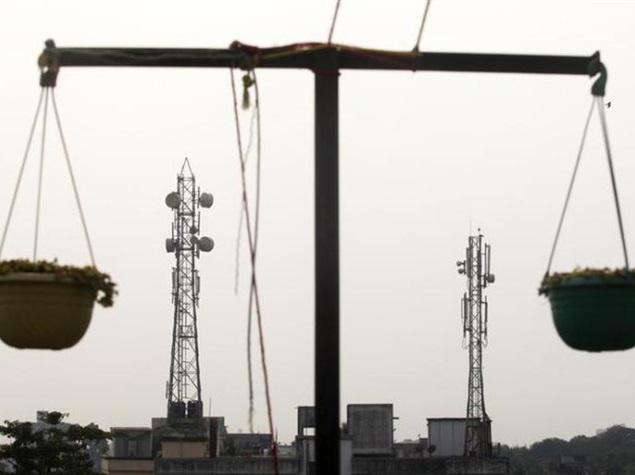- Home
- Telecom
- Telecom News
- Trai Recommends Sharing of All Telecom Spectrum
Trai Recommends Sharing of All Telecom Spectrum

"All access spectrum i.e. spectrum in the bands of 800/ 900/ 1800/ 2100/ 2300/ 2500MHz will be sharable provided that both the licensees are having spectrum in the same band,"
Telecom Regulatory Authority of India (Trai) said in its recommendation on Guidelines on Spectrum Sharing.
At present, telecom operators have been allocated airwaves frequency in 800MHz (CDMA), 900MHz, 1800MHz, 2100MHz (3G), 2300MHz and 2500MHz (4G) for wireless telecom services.
The Economic Survey had earlier this month recommended the government to come out with better spectrum management through measures like trading and sharing of spectrum so as to bring down the cost of spectrum.
The price of spectrum in last auction was about five times more compared to price of spectrum allocated under old licencing regime. The new regime was notified in August 2013 by the Department of Telecommunications (DoT).
"If any one or both of the licensees, sharing their spectrum, have administratively assigned spectrum (allocated without auction) in that band, then, after sharing, they will be permitted to provide only those services which can be provided through the administratively held spectrum," Trai recommended.
At present, telecom operators are allowed to share passive infrastructure like mobile towers which has helped them reducing operational cost but not active infrastructure like spectrum.
The government in February 2012 in-principle approved sharing of only those spectrum under new licencing regime which have been purchased through spectrum auction to increase interest of bidders and enhance revenue generation in the auction.
It in-principle approved sharing of spectrum allocated without auction on condition that companies holding such airwaves will have to pay one-time spectrum charge which cumulatively amounted to about Rs. 30,000 crore for both GSM and CDMA spectrum as estimated by DoT last year.
Telecom companies have challenged in various courts the government's decision to impose one-time spectrum charge and the matter is subjudice. The move to allow sharing of all kind of airwaves if approved by the government, will benefit incumbent players like Airtel, Vodafone, Idea Cellular, Reliance Communications, Aircel and Tata Teleservices to bring down cost of spectrum ownership.
Trai has suggested restricting of spectrum sharing to maximum two operators only. The regulator has also recommended that the government should allow sharing of even 3G spectrum which was specifically barred earlier.
However, it has suggested that sharing of spectrum in same frequency bands should be allowed. This means a company cannot share 4G spectrum with another company that does not hold the same spectrum, or 3G with company not holding 3G spectrum.
Trai has recommended that telecom operators may only need to inform licensing authority, at present DoT, about their agreement on spectrum sharing and require no permission from government for sharing of airwaves.
However, the Wireless Planning & Coordination Wing (WPC), which is custodian of spectrum, will have authority to raise objection, if any, to spectrum sharing agreement.
In this case, Trai recommended that WPC should inform about objection within 15 days and companies entered into agreement should reply to the WPC within the next 15 days of the receiving of the communication from the wing.
"The WPC will take a final decision and communicate within the next 15 days to the licensees. If WPC does not make any communication within the prescribed period, it will be assumed that the sharing agreement has become operational," Trai recommended.
The regulator clarified that spectrum sharing should not mean merger of networks.
"Spectrum sharing will be restricted to sharing by only two licensees subject to the condition that there will be at least two independent networks provided in the same band," Trai said.
Trai has recommended that DoT should levy one-time non-refundable fee of Rs. 50,000 per operator for each service area in which they opt for spectrum sharing. The regulator has recommended that 50 percent of spectrum held by one telecom operator in the spectrum band being shared will be considered as additional spectrum for the other for calculation purpose under the spectrum cap rule.
As per the rule, a telecom company can hold maximum of 50 percent spectrum assigned to all companies in a circle and 25 percent in a frequency band.
The recommendation of Trai will be studied by the DoT and placed before inter-ministerial panel Telecom Commission (TC) for their decision.For the latest tech news and reviews, follow Gadgets 360 on X, Facebook, WhatsApp, Threads and Google News. For the latest videos on gadgets and tech, subscribe to our YouTube channel. If you want to know everything about top influencers, follow our in-house Who'sThat360 on Instagram and YouTube.
Related Stories
- Samsung Galaxy Unpacked 2025
- ChatGPT
- Redmi Note 14 Pro+
- iPhone 16
- Apple Vision Pro
- Oneplus 12
- OnePlus Nord CE 3 Lite 5G
- iPhone 13
- Xiaomi 14 Pro
- Oppo Find N3
- Tecno Spark Go (2023)
- Realme V30
- Best Phones Under 25000
- Samsung Galaxy S24 Series
- Cryptocurrency
- iQoo 12
- Samsung Galaxy S24 Ultra
- Giottus
- Samsung Galaxy Z Flip 5
- Apple 'Scary Fast'
- Housefull 5
- GoPro Hero 12 Black Review
- Invincible Season 2
- JioGlass
- HD Ready TV
- Laptop Under 50000
- Smartwatch Under 10000
- Latest Mobile Phones
- Compare Phones
- OnePlus 13T
- Honor 400 Lite
- Honor Play 60m
- Honor Play 60
- Poco C71
- Lava Bold 5G
- Huawei Pura X
- Motorola Edge 60 Fusion
- Acer TravelLite (2025)
- Asus Zenbook 14 (2025)
- Samsung Galaxy Tab S10 FE+
- Samsung Galaxy Tab S10 FE
- Garmin Instinct 3
- Garmin Instinct E
- Haier M80F Mini LED 4K
- Haier M95E
- Nintendo Switch 2
- Sony PlayStation 5 Pro
- LG 1 Ton 3 Star Inverter Split AC (US-Q12JNXE)
- LG 1.5 Ton 3 Star Inverter Split AC (TS-UH19VNXE)

















